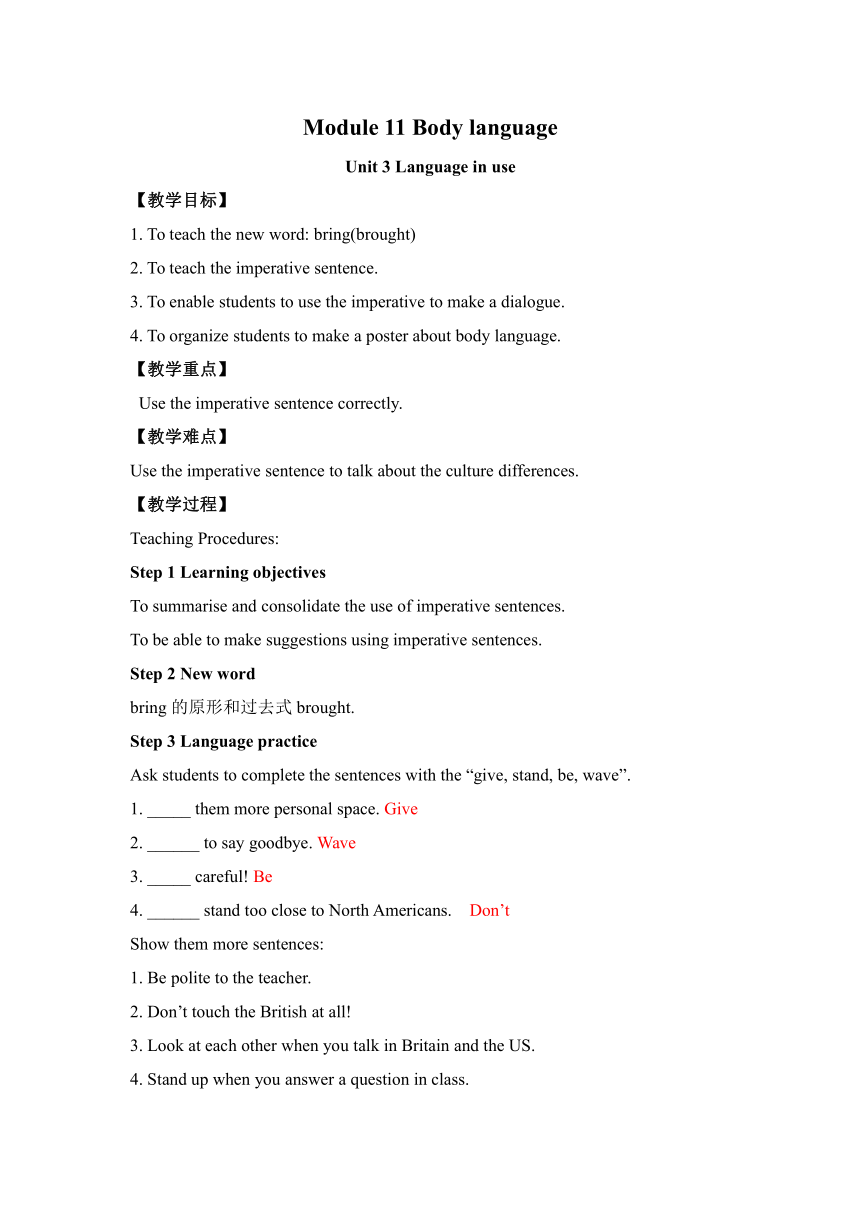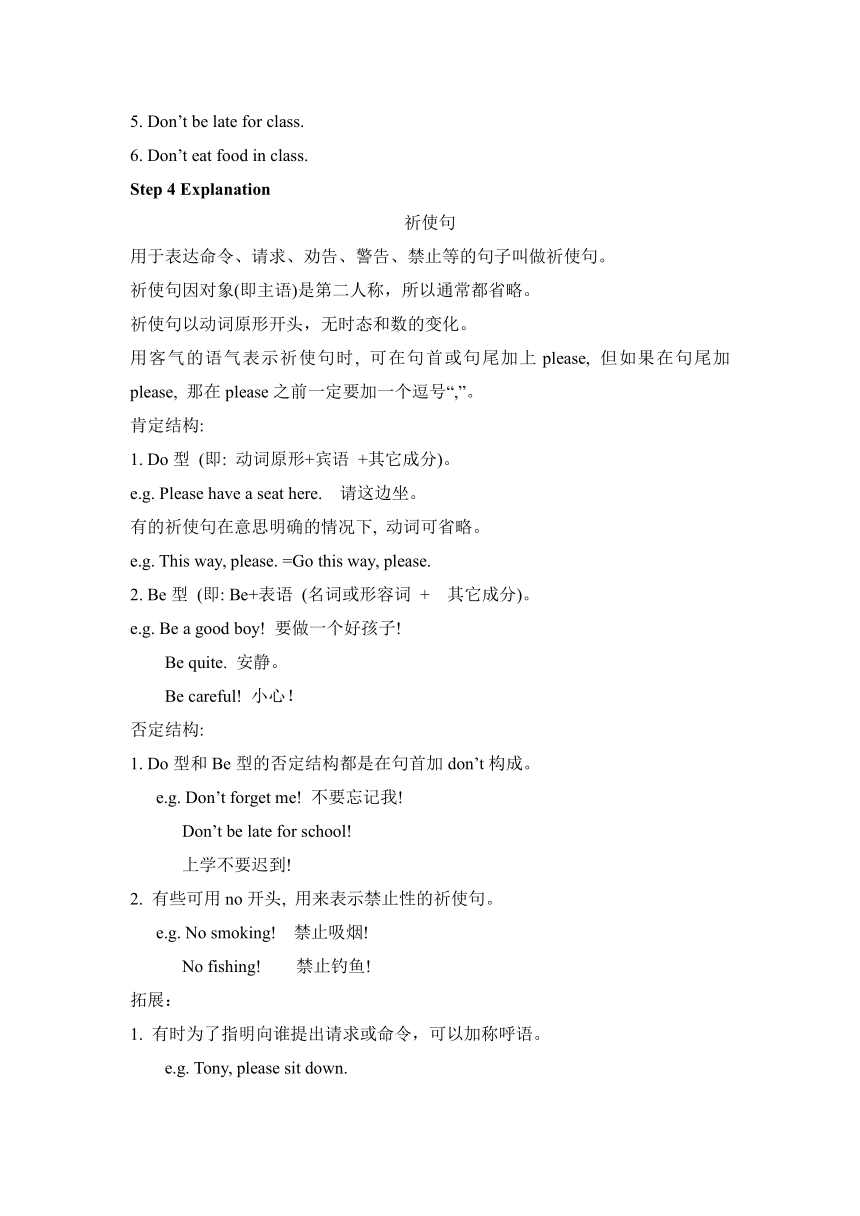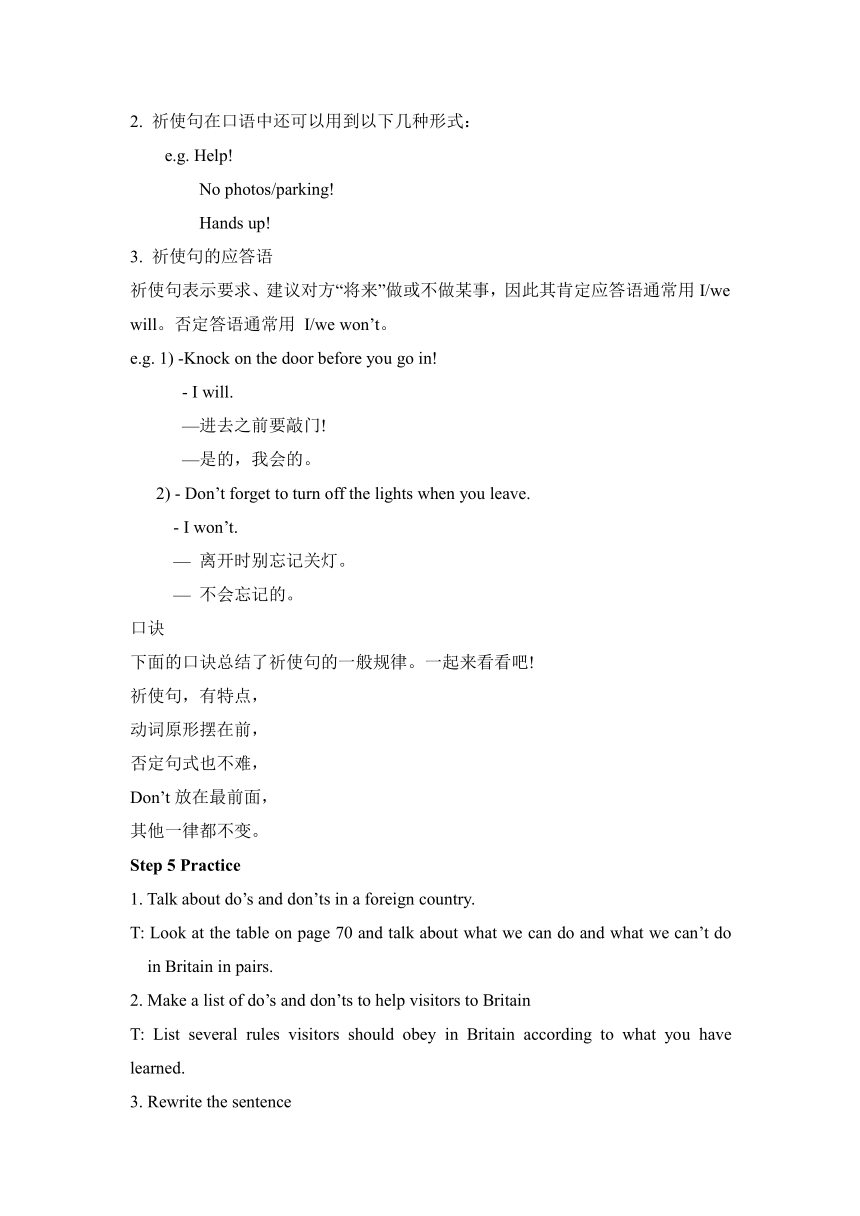Module 11 Unit 3 Language in use教案 外研版英语七年级下册
文档属性
| 名称 | Module 11 Unit 3 Language in use教案 外研版英语七年级下册 |

|
|
| 格式 | docx | ||
| 文件大小 | 136.0KB | ||
| 资源类型 | 教案 | ||
| 版本资源 | 外研版 | ||
| 科目 | 英语 | ||
| 更新时间 | 2024-02-23 00:00:00 | ||
图片预览



文档简介
Module 11 Body language
Unit 3 Language in use
【教学目标】
1. To teach the new word: bring(brought)
2. To teach the imperative sentence.
3. To enable students to use the imperative to make a dialogue.
4. To organize students to make a poster about body language.
【教学重点】
Use the imperative sentence correctly.
【教学难点】
Use the imperative sentence to talk about the culture differences.
【教学过程】
Teaching Procedures:
Step 1 Learning objectives
To summarise and consolidate the use of imperative sentences.
To be able to make suggestions using imperative sentences.
Step 2 New word
bring的原形和过去式brought.
Step 3 Language practice
Ask students to complete the sentences with the “give, stand, be, wave”.
1. _____ them more personal space. Give
2. ______ to say goodbye. Wave
3. _____ careful! Be
4. ______ stand too close to North Americans. Don’t
Show them more sentences:
1. Be polite to the teacher.
2. Don’t touch the British at all!
3. Look at each other when you talk in Britain and the US.
4. Stand up when you answer a question in class.
5. Don’t be late for class.
6. Don’t eat food in class.
Step 4 Explanation
祈使句
用于表达命令、请求、劝告、警告、禁止等的句子叫做祈使句。
祈使句因对象(即主语)是第二人称,所以通常都省略。
祈使句以动词原形开头,无时态和数的变化。
用客气的语气表示祈使句时, 可在句首或句尾加上please, 但如果在句尾加please, 那在please之前一定要加一个逗号“,”。
肯定结构:
1. Do型 (即: 动词原形+宾语 +其它成分)。
e.g. Please have a seat here. 请这边坐。
有的祈使句在意思明确的情况下, 动词可省略。
e.g. This way, please. =Go this way, please.
2. Be型 (即: Be+表语 (名词或形容词 + 其它成分)。
e.g. Be a good boy! 要做一个好孩子!
Be quite. 安静。
Be careful! 小心!
否定结构:
1. Do型和Be型的否定结构都是在句首加don’t构成。
e.g. Don’t forget me! 不要忘记我!
Don’t be late for school!
上学不要迟到!
2. 有些可用no开头, 用来表示禁止性的祈使句。
e.g. No smoking! 禁止吸烟!
No fishing! 禁止钓鱼!
拓展:
1. 有时为了指明向谁提出请求或命令,可以加称呼语。
e.g. Tony, please sit down.
2. 祈使句在口语中还可以用到以下几种形式:
e.g. Help!
No photos/parking!
Hands up!
3. 祈使句的应答语
祈使句表示要求、建议对方“将来”做或不做某事,因此其肯定应答语通常用I/we will。否定答语通常用 I/we won’t。
e.g. 1) -Knock on the door before you go in!
- I will.
—进去之前要敲门!
—是的,我会的。
2) - Don’t forget to turn off the lights when you leave.
- I won’t.
— 离开时别忘记关灯。
— 不会忘记的。
口诀
下面的口诀总结了祈使句的一般规律。一起来看看吧!
祈使句,有特点,
动词原形摆在前,
否定句式也不难,
Don’t放在最前面,
其他一律都不变。
Step 5 Practice
1. Talk about do’s and don’ts in a foreign country.
T: Look at the table on page 70 and talk about what we can do and what we can’t do in Britain in pairs.
2. Make a list of do’s and don’ts to help visitors to Britain
T: List several rules visitors should obey in Britain according to what you have learned.
3. Rewrite the sentence
First, let Ss look at the example. Then let Ss follow the example to finish the following five sentences. The main purpose is to master the imperative sentence.
4. Answer the questions
T: Read the words in the box, then answer the questions using the words and expressions.
Step 6 Around the world
Let Ss learn about the Japanese bow.
Step 7 Module task
1. Talk about different ways of saying hello and body language in China
Work in pairs. As a Chinese, we have our own ways of saying hello and body language in China. Please talk about them in pairs.
2. Write the information on your poster
After talking about the ways, you can write the information on your poster.
3. Find or draw some pictures to add to your poster
Collect some pictures from the newspaper and magazines and add them to the poster.
Step 8 Summary
祈使句用来表达请求、命令、劝告、希望、叮嘱等。
祈使句的主语通常为第二人称you,且常省略,谓语动词一律用动词原形。
祈使句一般没有时态变化,也不能与情态动词连用。
肯定式:动词原形+其他成分(通常句首或句末加please)。
否定形式:在谓语动词前面加do not (don’t)。
Step 9 Exercises
Ⅰ. 根据语境,从方框中选择恰当的动词填空。
think, be, try, sweep, get
1. ________ up early tomorrow.
2. Please ________ the floor.
3. ________ it again before you do it.
4. This job is a little hard. ________ your best!
5. Jack, ________ careful when you do your homework.
Ⅱ. 根据图片及提示词,用英语写几条图书馆守则(使用祈使句)。
1. (shout)
________________________
2. (run)
________________________
3. (bring)
________________________
4.(write, draw)
________________________
Ⅲ. 根据短文内容,从方框中选择恰当的单词填空,使短文完整、通顺,注意形式变化,每词限用一次。
get, strict, more, arrive, finish, play, cut, go, important, relax
Liu Wei has got many rules at home and school.
At home, Liu’s parents are very (1)________. From Monday to Friday, his mum asks him to (2)________ up at 6:30 am. He has to (3)________ his homework before dinner. He can’t watch TV or (4)________ computer games. He has to read books for an hour before (5)________ to bed. At weekends, he can go out and (6)________ in the afternoon, but he can’t in the morning or at night.
At school, he has got (7)________ rules. He has to (8)________ at school on time. He has to (9)________ his hair short and he can’t listen to music in the classroom ...
Liu Wei knows these rules are (10)________, but he is under a lot of pressure (压力) at the same time.
Step 10 Homework
Write ten short imperative sentences about table manners
Unit 3 Language in use
【教学目标】
1. To teach the new word: bring(brought)
2. To teach the imperative sentence.
3. To enable students to use the imperative to make a dialogue.
4. To organize students to make a poster about body language.
【教学重点】
Use the imperative sentence correctly.
【教学难点】
Use the imperative sentence to talk about the culture differences.
【教学过程】
Teaching Procedures:
Step 1 Learning objectives
To summarise and consolidate the use of imperative sentences.
To be able to make suggestions using imperative sentences.
Step 2 New word
bring的原形和过去式brought.
Step 3 Language practice
Ask students to complete the sentences with the “give, stand, be, wave”.
1. _____ them more personal space. Give
2. ______ to say goodbye. Wave
3. _____ careful! Be
4. ______ stand too close to North Americans. Don’t
Show them more sentences:
1. Be polite to the teacher.
2. Don’t touch the British at all!
3. Look at each other when you talk in Britain and the US.
4. Stand up when you answer a question in class.
5. Don’t be late for class.
6. Don’t eat food in class.
Step 4 Explanation
祈使句
用于表达命令、请求、劝告、警告、禁止等的句子叫做祈使句。
祈使句因对象(即主语)是第二人称,所以通常都省略。
祈使句以动词原形开头,无时态和数的变化。
用客气的语气表示祈使句时, 可在句首或句尾加上please, 但如果在句尾加please, 那在please之前一定要加一个逗号“,”。
肯定结构:
1. Do型 (即: 动词原形+宾语 +其它成分)。
e.g. Please have a seat here. 请这边坐。
有的祈使句在意思明确的情况下, 动词可省略。
e.g. This way, please. =Go this way, please.
2. Be型 (即: Be+表语 (名词或形容词 + 其它成分)。
e.g. Be a good boy! 要做一个好孩子!
Be quite. 安静。
Be careful! 小心!
否定结构:
1. Do型和Be型的否定结构都是在句首加don’t构成。
e.g. Don’t forget me! 不要忘记我!
Don’t be late for school!
上学不要迟到!
2. 有些可用no开头, 用来表示禁止性的祈使句。
e.g. No smoking! 禁止吸烟!
No fishing! 禁止钓鱼!
拓展:
1. 有时为了指明向谁提出请求或命令,可以加称呼语。
e.g. Tony, please sit down.
2. 祈使句在口语中还可以用到以下几种形式:
e.g. Help!
No photos/parking!
Hands up!
3. 祈使句的应答语
祈使句表示要求、建议对方“将来”做或不做某事,因此其肯定应答语通常用I/we will。否定答语通常用 I/we won’t。
e.g. 1) -Knock on the door before you go in!
- I will.
—进去之前要敲门!
—是的,我会的。
2) - Don’t forget to turn off the lights when you leave.
- I won’t.
— 离开时别忘记关灯。
— 不会忘记的。
口诀
下面的口诀总结了祈使句的一般规律。一起来看看吧!
祈使句,有特点,
动词原形摆在前,
否定句式也不难,
Don’t放在最前面,
其他一律都不变。
Step 5 Practice
1. Talk about do’s and don’ts in a foreign country.
T: Look at the table on page 70 and talk about what we can do and what we can’t do in Britain in pairs.
2. Make a list of do’s and don’ts to help visitors to Britain
T: List several rules visitors should obey in Britain according to what you have learned.
3. Rewrite the sentence
First, let Ss look at the example. Then let Ss follow the example to finish the following five sentences. The main purpose is to master the imperative sentence.
4. Answer the questions
T: Read the words in the box, then answer the questions using the words and expressions.
Step 6 Around the world
Let Ss learn about the Japanese bow.
Step 7 Module task
1. Talk about different ways of saying hello and body language in China
Work in pairs. As a Chinese, we have our own ways of saying hello and body language in China. Please talk about them in pairs.
2. Write the information on your poster
After talking about the ways, you can write the information on your poster.
3. Find or draw some pictures to add to your poster
Collect some pictures from the newspaper and magazines and add them to the poster.
Step 8 Summary
祈使句用来表达请求、命令、劝告、希望、叮嘱等。
祈使句的主语通常为第二人称you,且常省略,谓语动词一律用动词原形。
祈使句一般没有时态变化,也不能与情态动词连用。
肯定式:动词原形+其他成分(通常句首或句末加please)。
否定形式:在谓语动词前面加do not (don’t)。
Step 9 Exercises
Ⅰ. 根据语境,从方框中选择恰当的动词填空。
think, be, try, sweep, get
1. ________ up early tomorrow.
2. Please ________ the floor.
3. ________ it again before you do it.
4. This job is a little hard. ________ your best!
5. Jack, ________ careful when you do your homework.
Ⅱ. 根据图片及提示词,用英语写几条图书馆守则(使用祈使句)。
1. (shout)
________________________
2. (run)
________________________
3. (bring)
________________________
4.(write, draw)
________________________
Ⅲ. 根据短文内容,从方框中选择恰当的单词填空,使短文完整、通顺,注意形式变化,每词限用一次。
get, strict, more, arrive, finish, play, cut, go, important, relax
Liu Wei has got many rules at home and school.
At home, Liu’s parents are very (1)________. From Monday to Friday, his mum asks him to (2)________ up at 6:30 am. He has to (3)________ his homework before dinner. He can’t watch TV or (4)________ computer games. He has to read books for an hour before (5)________ to bed. At weekends, he can go out and (6)________ in the afternoon, but he can’t in the morning or at night.
At school, he has got (7)________ rules. He has to (8)________ at school on time. He has to (9)________ his hair short and he can’t listen to music in the classroom ...
Liu Wei knows these rules are (10)________, but he is under a lot of pressure (压力) at the same time.
Step 10 Homework
Write ten short imperative sentences about table manners
同课章节目录
- Module 1 Lost and found
- Unit 1 Whose bag is this?
- Unit 2 Are they yours?
- Unit 3 Language in use
- Module 2 What can you do ?
- Unit 1 I can play the piano
- Unit 2 I can run really fast
- Unit 3 Language in use
- Module 3 Making plans
- Unit 1 What are you going to do at the weekends?
- Unit 2 We're going to cheer the players.
- Unit 3 Language in use
- Module 4 Life in the future
- Unit 1 Everyone will study at home
- Unit 2 Every family will have a small plane.
- Unit 3 Language in use
- Module 5 Shopping
- Unit 1 What can I do for you?
- Unit 2 You can buy everything on the Internet
- Unit 3 Language in use
- Module 6 Around town
- Unit 1 Could you tell me how to get to the Nationa
- Unit 2 The London Eye is on your right.
- Unit 3 Language in use
- Revision module A
- Module 7 My past life
- Unit 1 I was born in a small village.
- Unit 2 I was born in Quincy.
- Unit 3 Language in use
- Module 8 Story time
- Unit 1 Once upon a time….
- Unit 2 Goldilocks hurried out of the house.
- Unit 3 Language in use
- Module 9 Life history
- Unit 1 He left school and began work at the age of
- Unit 2 He decided to be an actor.
- Unit 3 Language in use
- Module 10 A holiday journey
- Unit 1 What did you do?
- Unit 2 This morning we took a walk.
- Unit 3 Language in use
- Module 11 Body language
- Unit 1 They touch noses!
- Unit 2 Here are some ways to welcome them.
- Unit 3 Language in use
- Module 12 Western music
- Unit 1 It's so beautiful!
- Unit 2 Vienna is the centre of European classical
- Unit 3 Language in use
- Revision module B
